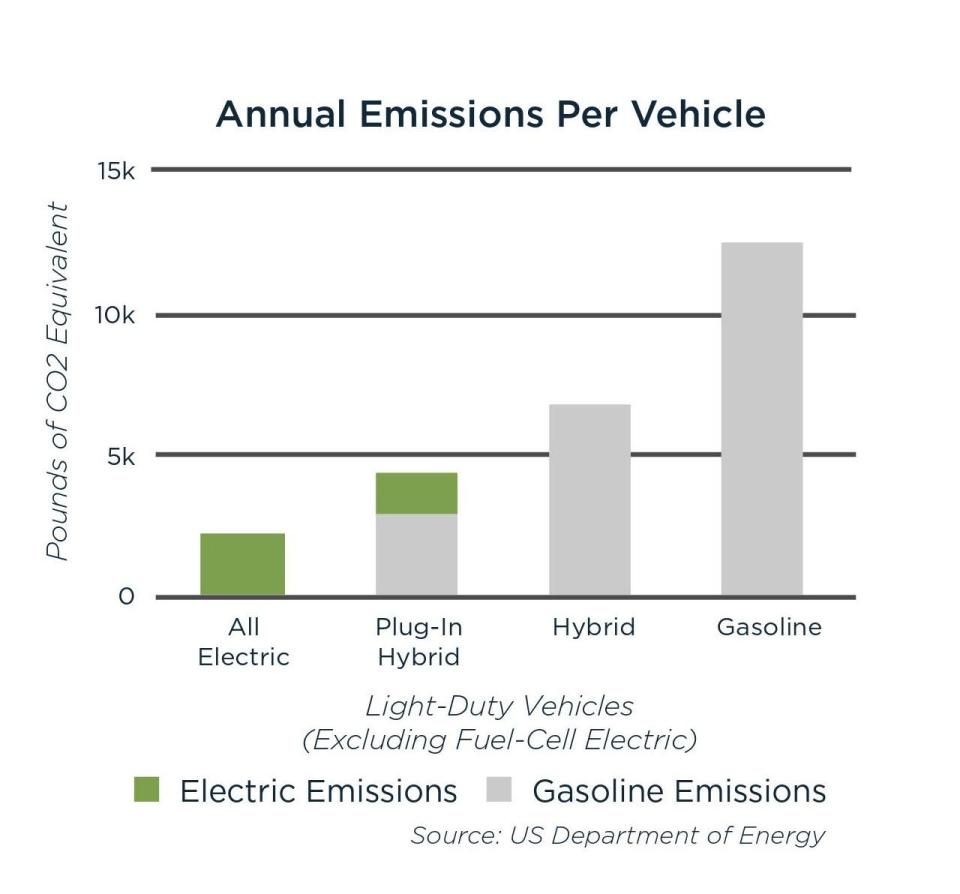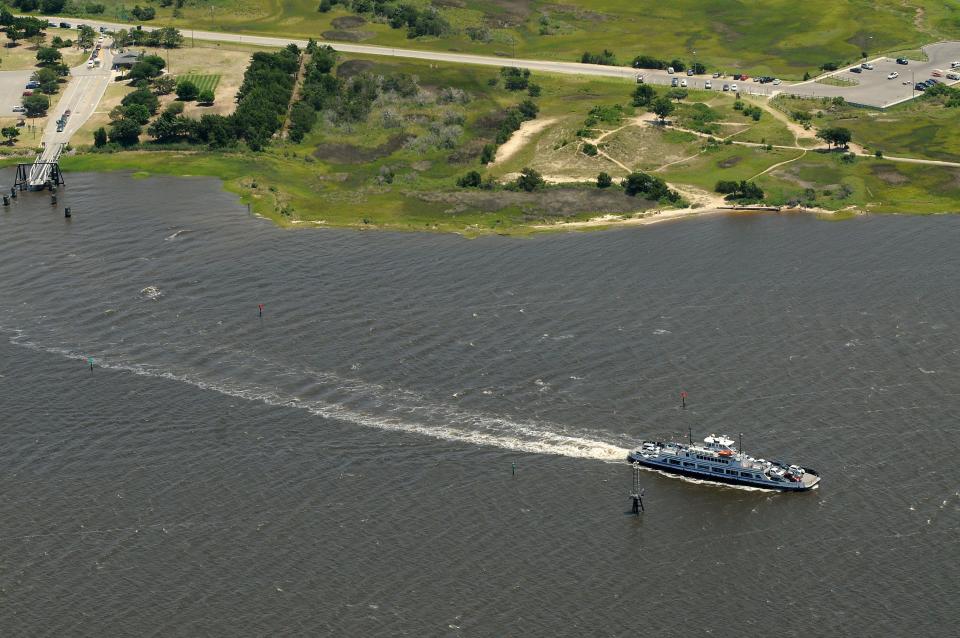Plug and sail: Could electric-powered ferries be coming to the North Carolina coast?
- Oops!Something went wrong.Please try again later.
Imagine sliding out of Fort Fisher on the state ferry and only hearing the wind and the waves as you head across the mouth of the Cape Fear River toward Southport in Brunswick County.
Well, and the seagulls.
That could soon be a reality if a study shows it's feasible to switch some of the shorter ferry routes operated by the N.C. Department of Transportation, including the Fort Fisher-Southport run, to boats powered by electricity instead of diesel fuel.
There are still plenty of hoops to jump through any switch would have to pass, and the study is still underway. But Dr. John Hildreth, a professor of construction management at Western Carolina University who is leading the study, said going electric is the wave of the future.
"This is the way the industry is moving," he said. "You are going to be buying a horse and buggy if you buy a diesel-powered ferry in the not-to-distant future."
Less tailpipe emissions
The idea of electrifying at least part of the state's ferry system is part of a larger push by Gov. Roy Cooper to take a big chunk out of the state's greenhouse gas emissions produced by the transportation sector.
According to the latest greenhouse gas inventory report, 36% of North Carolina's greenhouse gases are emitted by cars, trucks, busses, boats, and other transportation-related uses. The biggest chunk of that is by personal vehicles - largely because 77.2% of North Carolinians drive to work alone while less than 1% use mass-transit or bike to work.
With the state's population booming, that's led to the vehicle miles traveled (VMT) per capita - which is the total annual miles of vehicle travel divided by total population - to explode in recent years. The VMT Reduction Study, undertaken by the DOT, reported that between 2003 and 2019, the annual VMT in the United States grew by 13%, from 2.89 trillion to 3.26 trillion. During that same period, VMT in North Carolina grew from 93.7 billion to 123.1 billion, an overall increase of 31%.
POWER OF THE PEN How Gov. Cooper's executive orders have driven a lot of NC's green agenda
Along with tackling emissions from power plants, which resulted in bipartisan legislation to see the state phase out its remaining coal plants in favor of cleaner power sources and reach net-zero emissions by 2050, Cooper has been aggressively pushing to get more electric and plug-in hybrid vehicles on the state's roads. That includes getting the state government to add more zero-emission vehicles to its fleet, increasing the number of charging stations across the state - especially in rural areas, and speeding up the adoption of electric trucks and busses.
The latest push in this process is the N.C. Clean Transportation Plan, released earlier this month. The plan is a guidance document that provides a coordinated strategy for accelerating decarbonization in the transportation sector. It involves public and private stakeholders in a number of initiatives and programs to help reduce the state's carbon footprint by promoting cleaner transportation options and strategies.

Cynthia Satterfield, director of the N.C. Sierra Club, said there a lot of good ideas and proposals in the new plan.
"But we need more details, more specifics," she said. "It's largely a plan to plan for further action."
While Satterfield admitted the political dynamic in Raleigh, where Republicans control both chambers of the N.C. General Assembly, isn't the most favorable for Cooper, a Democrat, she was glad to see a lot of the plan's focus was on underserved and rural communities that often miss out on "green" infrastructure and projects.
"We need to make sure we reaching out to and serving all North Carolinians," she said.
'It's certainly feasible'
As a branch of state government, it makes sense for the DOT to look at ways to make North Carolina's ferries "greener."
But charging up a vehicle-carrying ferry isn't quite the same as plugging a Tesla into your car charger in your garage.

Yet, it's not that different, Western Carolina's Hildreth said.
"Sure, it's bigger and would require more batteries and upgrades to the charging facilities at the ferry terminals," he said. "But what we figured out fairly quickly is it's certainly feasible."
Already ferry systems in Europe and in North America, including large operations like those in Washington state and Canada's British Columbia, have either adopted electric-powered ferries or have looked into it and are seriously interested in deploying vessels powered by the plug. Washington State Ferries, for example, has secured $1.33 billion to build up to five large hybrid electric ferries, convert another four ferries, and add charging infrastructure to some ferry terminals. The overall project cost is estimated to be around $4 billion.

Although on a smaller scale, Hildreth said the famous "Maid of the Mist" ferries that carry tourists to view - and get soaked by - Niagara Falls are electric powered.
Now electric-powered ferries wouldn't be ditching their old diesel engines completely.
"We're not eliminating the internal-combustion engines on board the vessel," Hildreth said. "It just would no longer be the primary power source, but a backup."
A smoother, quieter ride
Along with a ride that's better for the environment, electric ferries also have another advantage over traditionally powered vessels.
"It's a very different ride experience," Hildreth said. "You don't get the noise, the exhaust fumes or the vibrations. It's a nicer way to travel."

The study, which doesn't have Hildreth and his team designing an electric ferry but conducting a technical and feasibility analysis, is expected to wrap up by this fall. But Hildreth said it's already quite apparent that, like the electrification process now underway in the automotive industry, the upfront capital costs for an electric ferry are greater than those for a diesel-powered vessel.
"But the operation and maintenance costs are substantially lower, and that's largely based on fuel and maintenance costs," he added, noting those cost savings would quickly add up over the roughly 40-year lifespan of a new electric ferry.
One variable that could makes costs change from site to site is the price of electricity.
PLUG AND DRIVE Will 2023 be the year the electric vehicle hits the fast lane in North Carolina?
"We've seen that can vary a lot by location," Hildreth said.
While turning some of the state's ferries into plug-and-sail vessels might not have the overall environmental impact of getting thousands of gas-powered vehicles off North Carolina roads, Sierra Club's Satterfield said adopting electric ferries offers the state a high-profile opportunity to show it is working hard to clean up the state's transportation sector.
"It is worth pursuing because traveling by ferry isn't something most people take for granted, so they will notice, and that's important to help increase people's awareness and buy-in of the efforts to clean up the state's transportation sector," she said.
Reporter Gareth McGrath can be reached at GMcGrath@Gannett.com or @GarethMcGrathSN on Twitter. This story was produced with financial support from 1Earth Fund and the Prentice Foundation. The USA TODAY Network maintains full editorial control of the work.
This article originally appeared on Wilmington StarNews: Could electric-powered ferries be coming to the North Carolina coast?

